January 31, 2013
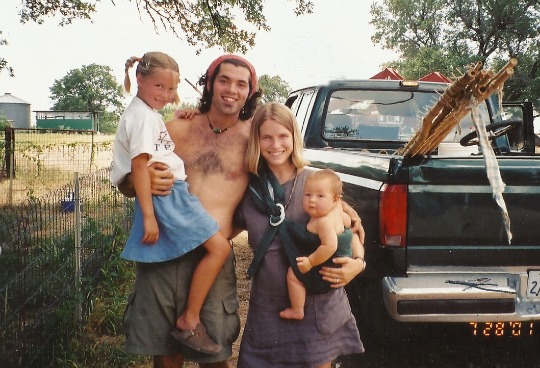
Our chicken farming days.
Several of you have asked for it — here it is: my journey through idealism and how I finally made peace with “imperfection.”
When I was 17, still in high school, and passionately seeking to define myself, I took a personality indicator test, designed to measure how people perceive the world and make decisions. Proudly, I owned the resulting summarization of ME as, “Idealistic: a person who represents things as they might or should be rather than as they are.”
I was ecstatic. Someone, somewhere understood me — heck, there were probably even others out there like me! I embraced my new title, vowed to use my natural born vision to better the world and set off to educate myself about issues I saw as most important.
Studying sustainable agriculture in college, I sewed, thrifted and propagated my way through the early days of single parenthood, satiating my growing urgency to make a difference by attempting (in vain) to reform the snack policies at my daughter’s preschool, convincing reluctant grocers to give us their discarded produce for dehydration and theorizing about off-grid living and intentional communities with the few fellow visionaries I had, indeed, met along the way (now my closest friends and husband).
A full-time mother my entire 20s, my idealism was further fueled by the obviously crucial work of saving motherhood from the clutches of our confused and commercialized culture. I honored my utopic vision by promoting and encouraging home birth, breastfeeding, cloth diapering, baby-wearing, co-sleeping, and handmade everything. By the time my third daughter was born, however, and considering that I was also needed to make financial contributions to the family, the level of activity required to maintain my standards, my household and my work for pay (with the children home) was starting to wear on me — just a bit.
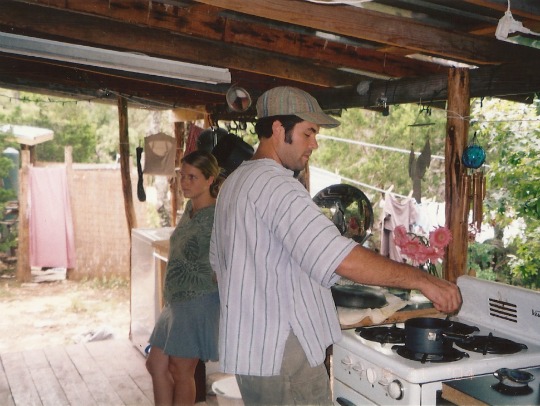
Our porch kitchen, a week after the birth of my third baby. The structure at the back left was our shower.
Funny, other mothers I knew did not speak of ridiculously long to-do lists with bullets like, “hang diapers to dry,” “design, cut and sew 40 linen dresses,” or “hand print the holiday gift-wrap.”
Maybe they were cool with compromise, but I was on a mission.
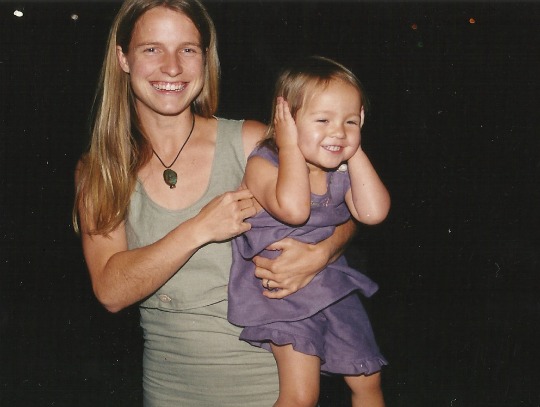
My clothing line, Green Beings. I made kid’s clothes and nursing wear from organic cotton, hemp and linen, finishing them with hand-embroidery. Hunter made the buttons from deer antlers, and yes, we ate a ton of venison.
Determined as I was, my frustration was mounting. I found myself in a constant struggle between whether it was more important to dig the garden (with a baby on my back), teach the kids to embroider, bake bread from scratch or research grant money available for the graduate program I hoped to begin. (Never mind dump the compost bucket toilets, bathe the kids in frigid water or sling a hammer alongside my mate lest it rain through the unfinished roof).
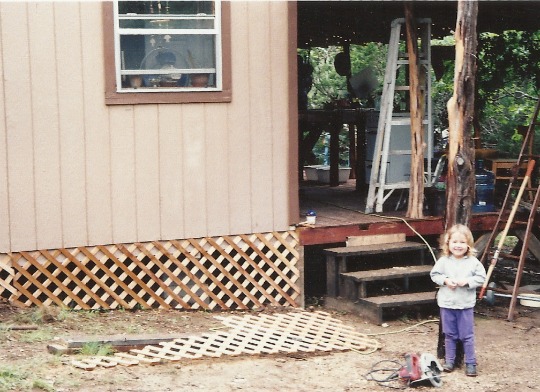
The 240 square foot house (tool shed) we lived in for three years (and where baby number three was born). To the right is the outdoor kitchen made from reclaimed fencing.
The list seemed to grow twice as fast as I could check things off. Occasionally Hunter would look at my transcribed prioritization and, perplexed, question my logic. “Why do you have to make 20 snow globes as party favors?” or “Don’t you think the cold frames can wait until next year?” to which I would roll my eyes, hand him the baby and get back to work.
Though I couldn’t see it at the time, I had inadvertently bought into the cultural lies that told me more was better, while still holding tight to my ideals about the “best” way to live. Passionate about so many subjects, and feeling somehow that compromise equaled failure, I had created an unrealistic and unfulfilling lifestyle that left me wondering what else I could add to create the harmony I envisioned. John Galsworthy sums it up perfectly, “Idealism increases in direct proportion to one’s distance from the problem.” Boy, was I at close range.
After baby number four, I hit bottom. It was either succumb to defeat and compromise or lose my maternal mind. Looking back over the years leading up to that point I can see a pretty clear progression:
Idealism, unchecked, bred perfectionism.
Perfectionism, unchecked, bred a sense of inadequacy.
Inadequacy, unchecked, bred disappointment.
Disappointment, unchecked, bred cynicism.
Cynicism, unchecked, eventually bred anger.
And angry I was. Angry with myself for having “failed,” angry with the world for its utter and plentiful injustices and angry with my husband for, well, just about everything.
Reluctantly, I began letting go. I bought disposable diapers and used them when I was behind on the laundry or running errands. I stocked up on frozen pizzas and let the sun have the garden. I started asking friends about their transition from homeschooling to public school and napped with the kids instead of frantically cleaning or catching up with the day’s busy work. I incorporated a night to myself every week and slowly felt life flowing through me again.
Newly receptive to the advice of others, I cried on the shoulders of wise women and respected elders, I poured through books in search of the peace I sought and begged my maker for clarity. I was just trying to live right! How could I have invested so much of myself and still failed so miserably?
Then, just when I was vulnerable enough to fully receive it, it came — the missing piece (and the missing peace). The single most life-changing perspective shift I’ve experienced to-date:
Everything is exactly as it is supposed to be in this moment — because in this moment, it can be no other way. Resisting what IS is our greatest source of misery.
{Byron Katie, you’re the shit.}
That profound realization led me to another:
Perfection and imperfection are nothing more than judgements — unevaluated stories disguised as “truth.”
And another:
I am the only one responsible for my actions, my reactions, my happiness and my suffering. No person or experience can make me feel anything I don’t choose.
Quite suddenly, by dropping the thought that the world is a troubled and messy place, I no longer carried the weight of it on my shoulders. My natural born tendencies toward idealism no longer obligated me to work toward positive change, but they equipped me. By seeing perfection as an arbitrary judgement and learning to embrace life in its current state, each moment was automatically infused with sufficiency. And by letting go of the thought that compromise equaled failure or weakness, it became not only my number one tool for staying centered, but the key to a realm of beauty I never knew existed.
I still very much think in terms of how things might or could be. It’s who I am. The difference is that because I see the sufficiency of now, I can function from a context of abundance instead of inadequacy, and consequently, I am more selective, effective and I love my life again.
—–
I’m not finished with this “compromise as a gateway to beauty” concept. I’ll be back next week with a few recent examples. See you then!
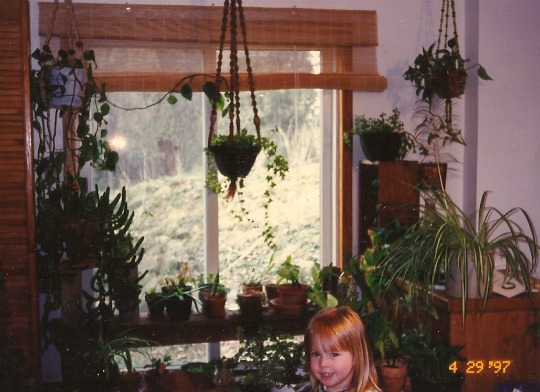
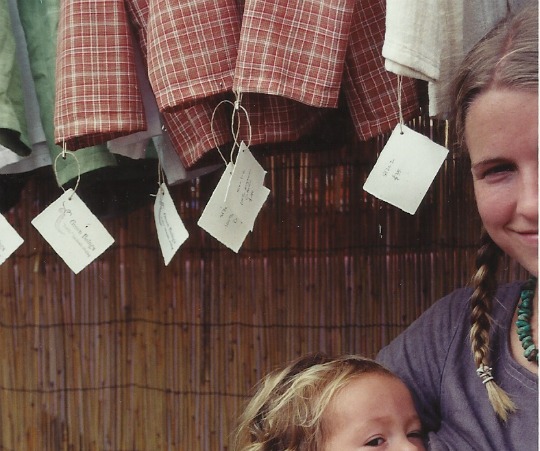
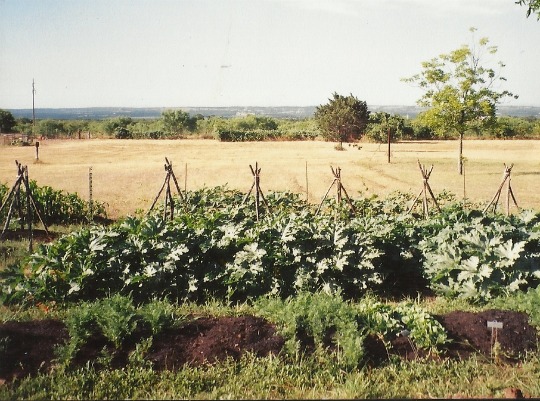
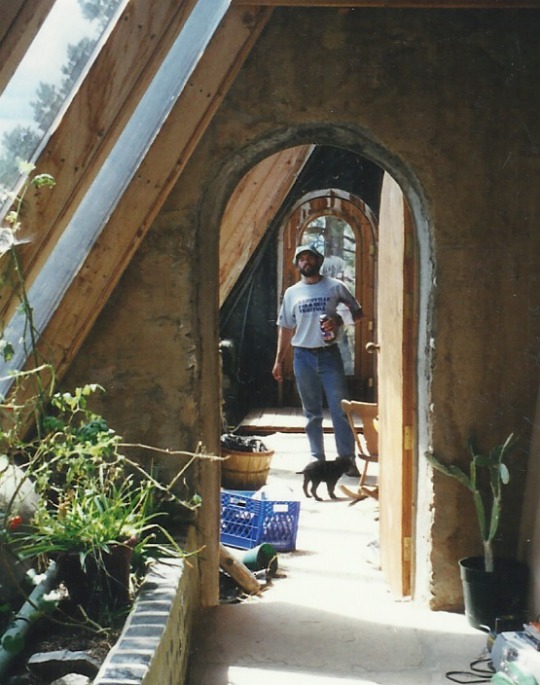
OK, I was totally with you until this one: “No person or experience can make me feel anything I don’t choose.” While I generally agree, I can’t go there with everything.
If my child were to die, I would feel profound grief. (I know, extreme example. I see things I’m wrestling with better in extremes.) I suppose I could choose grief. I suppose grief might be the best choice. But it wouldn’t really be a choice. I couldn’t choose happiness. I doubt I could choose peace. I think I could work my way to peace, maybe, but I don’t know that I could choose it. Peace more often seems to be a gift that lands on me. I can choose actions that are more likely to lead to peace than other actions, but I can never really control it.
Still, I really appreciate the thinking in this post. I’d like to know more about how it plays out in the concrete decisions you have to make every day. I wrestle with these questions a lot.
Rita – Absolutely. I think there are experiences that would challenge every one of these realizations and I am far from mastering any of them. For me though, this one in particular may actually have saved my marriage, as it helped me drop the blame and victim cards I had been playing and own my part in creating my happiness. I think what Byron Katie might say to the loss of a child example is that from places of grief (or fear or anger etc…) we often create our stories, and that we are better off evaluating such emotions first and deciding how they serve us before building our lives around them. I appreciate your two-bits. It was, indeed, a broad generalization.
Yes yes yes. And I think it’s so true for many, many things. (Guess I’m liking repeating my words tonight.)
i’ll be a buttinski here and add that one thing i’ve read about grief is that it’s a physical process- not unlike puberty and menopause- except that it’s primarily energetic. i believe grieving is out of our hands, but resisting the circumstances that generated the grief is solidly in our hands. we have to go through the energetic cycle of grief and it’s profound pain, but we don’t need to (like beth already said) amplify our own suffering (and the suffering of those around us) by resisting the origin and creating stories of blame, shame, etc….
Beautifully stated, beautiful lady. You can be a buttinski on my blog anyday.
Hi Rita,
I guess what your comment made me think of is the fact I would choose grief, deep sadness and feelings of great loss… if God forbid, I were to lose one of my sons.
I once heard someone say that there is a difference between dirty pain and clean pain. Grieving the loss of child is clean pain in my book. Choosing to stay in that pain when it is no longer wise to do so feels like dirty pain to me.
And of course I am assuming each and everyone of us has an innate wisdom letting us know when it is no longer clean pain, but I am willing to be wrong about this.
This post is exactly why I read yor blog.
right on!
This topic also relates a lot to seeing poverty/environmental problems in the world and feeling despondent because you can’t “fix” them or help everyone. I’ve written to you about this before as you have written posts on this topic. I feel like this general idea of acceptance of the now can be applied to many topics.
What Jamie said. 🙂
This is an amazingly insightful post. I can feel the pressure and stress you felt just reading your words, and it resonates with my own perfectionism. Thank you so much for sharing and for the wise words. I must check out Byron Katie as my MIL has been doing The Work for several years now (she’s even done the 9 day workshop)and can’t recommend it enough. I definitely love your blog.
Well that made me shed some tears, thanks very much!! haha I feel this everyday. Ive educated myself so that i know that my family needs Organic food, filtered water, organic clothes etc.. etc… the list goes on and on and yet…we dont have the money!! I Feel paralysed by….fear!! To be a compassionate mother who gives her children all the love, time, boob that they need.. its seems so unattainable at times and at the end of every day i feel like a failure. my husband told me the other day that i become more uptight as the years go on (we’ve been married 6 years, im 28 with 3 kids) which made me sad, then defensive, then sorry for him 🙂 And now im just tired, and spend more and more time on the internet looking at how together everyone else has it desperately looking for a magic answer that will help me live again. I really hope i can figure it out soon, this post was great thanks!! (sorry for the rant/sob story lol)
I second this! I feel like I could’ve written this comment (except that I’ve been married for 5 years and am 26 with 2 kids). I feel your pain
Thank you so much for this! It was just what I needed today. I made this same realization a few years ago and it has lifted that burden of needing to do it all and be perfect. I had lost myself for a few years and when I finally truly realized and accepted that “I am the only one responsible for my actions, my reactions, my happiness, my suffering”, I found peace and happiness within myself again. I found the old me. :). Great post! I love reading your blog!
Hi, I wanted to ask about Katie Byron. Did you just read her book? I have it but wish I had more of a workbook. I feel like i just keepi reading the first few chapters over and over and the try to apply itthen basically forget about it. Thought I would ask. Thanks, Bridget
Bridget – I read it for the first time five years ago and refer to it often. It lives on the back of my toilet. 😉 Initially I did do “the work” by writing it out. Now I just have the steps committed to memory and try and remember to use them when I start to feel off. Keep at it, or set it aside and pick it up again later. Sometimes things speak to us more profoundly at certain times. (Or you could try the toilet trick!)
Did you see Rhia’s comment? Byron Katie has an app!
Oh great! I will check it out!
good god, I love you!!! Byron Katie also has a great app that guides you through the work from your phone! I miss you woman! keep up the amazing work!!!
Thanks!
beth….. just…… this.
Wow. Beautiful, interesting post. And beautiful, interesting comments too. This is the best example of a blog post that encompasses what it needs to without feeling rushed. Don’t know if you feel that way, but in light of your post reviewing the last–what year? six months? somthing, it looks like you’ve certainly figured something out! Thanks.
Oh wow, thank you so much for that message. It really hit home. I can relate so well to your struggles!
I have to say that I know many women who have gone down this same path, but have not come to the realizations that you have to save them. I am so impressed and inspired by your growth as a woman! Although I have Perfectionist tendencies I have never fully given in because I have seen so many women around me become consumed and fall apart, I do wish I could help them but it’s something they need to find for themselves. I have never read the Katie Byron book, but I feel it’s a bit similar to some Buddhist practices (being mindful and present, eliminating craving). I am not Buddhist but have been practicing meditation since I was a teen and I feel that this alone has helped me cope! Thanks for you post!
Excellent post. And, yes Katie’s message is something else.It changed my life too!
thank you so much for this post. it helps to be mindful and feel that we can DO something to change our minds and not just feel a victim of others, our own expectations or even our own emotions.
As always…..insightful, profound, and lovely. I read this post hungry for the next paragraph; my mind blurting out phrases like, ” YESYESYES!!!” and “oh kindred spirit!” Thank you, Universe, for the crossing of our paths……and thank you, Beth, for sharing your gifts!
Go Beth go! And may you and your loved ones be blessed even more…
Have you heard of the three principles? If you love Byron Katie, I think you will appreciate this as well.
Check out http://www.threeprinciplemovies.com
There are so many stories of hope from all walks of life after people came to understand these simple principles.
Today I spoke to my class about my personal definition of happiness and how the distance between where you are and what you want is the definition of our own suffering. Your daughter is in my class and shared this entry with me. Beautiful blog. It’s been great to have her in class this year!
Thank you, Kevin! Your definition of suffering is spot on and I so appreciate you offering such important perspectives to your students. I know Sigorni really enjoys your class. Keep up the invaluable work! The gift of invested teachers to culture as a whole is not lost on me.
I found your blog off of a link from facebook a few days ago and have been enthralled ever since!
This post, I think, will prove very helpful to me. It’s encouraging in this moment and I think it will bear good fruit in the future. I certainly have idealistic and perfectionist tenancies and your list of things leading to anger was very revealing and thought provoking.
Thank you…
You are amazing! Thank you for sharing so much of yourself and being so REAL, it’s refreshing and inspiring. I was so happy to read your other post today about you taking a little vaca away to work on your book. I’m with you, it’s so important for us mamas to pause and take time away so that WE CAN BE better mamas. Whether it’s away working on a project or just away taking baths, reading and sleeping. ALONE time is such a healer, and I’m now inspired to book my own little vaca.!!! Much love and support to you.